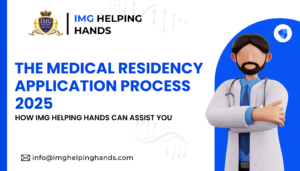
The Medical Residency Application Process 2025: How IMG Helping Hands Can Assist You
Have you ever wondered what it truly takes to secure your dream residency in an ever-evolving medical landscape? As we step into 2025, the residency

The United States Medical Licensing Examination (USMLE) is a three-step examination required for allopathic medical licensure in the United States. It assesses a physician’s ability to apply knowledge, concepts, and principles that are important in health and disease. Passing each step of the USMLE is required to qualify for medical residency training programs and for subsequent medical licensure. The examination is therefore critically important for any aspiring physician in the U.S.
The USMLE is sponsored, maintained, and developed jointly by the Federation of State Medical Boards (FSMB) and the National Board of Medical Examiners (NBME).
Step 1 assesses whether medical students can understand and can apply important concepts of the basic sciences fundamental to the practice of medicine. It covers material from the first two years of medical school, such as anatomy, behavioural sciences, biochemistry, microbiology, pathology, pharmacology, and physiology.
Step 2 has two parts: Clinical Knowledge (CK), which assesses the ability to apply medical knowledge and understanding of clinical science essential for patient care, and Clinical Skills (CS), which assesses skill in gathering information from patients, performing physical examinations, and communicating findings.
Step 3 assesses whether graduates can apply medical knowledge and understanding of biomedical and clinical science considered essential for unsupervised practice. It is typically taken at the end of the first year of residency.
Check out IMG HELPING HANDS for additional resources to support your USMLE journey.
Several key factors influence how much time a medical student or graduate should devote to preparing for each step of the USMLE exams. The specific exam being prepared for is a major consideration, as Step 1 generally requires the most lengthy preparation timeline.
Step 1 tests concepts from the basic medical sciences and the first two years of med school, so the foundational knowledge and academic performance from those initial medical school years impacts preparation time.
Students who struggled with introductory medical sciences may need more time to strengthen conceptual understanding and application for the boards. Those who excelled during their foundational coursework may require relatively less time to solidify knowledge and focus efforts on practice questions.
The number of months one can devote to full-time study also affects the Step 1 timeline. Most students spend 3 to 6 months in dedicated preparation for Step 1 after completing their basic science coursework. Some who are aiming for very high scores devote 6 to 12 months to intense study. For Steps 2 CK and 3, for which clinical knowledge is tested, the recommended timeline is shorter at 1 to 3 months and 1 to 2 months of dedicated study, respectively.
An individual’s learning style and need for repetition impacts preparation duration as well. Medical students who benefit from going through material multiple times may set aside more time to allow for in-depth review. Others who can absorb key concepts from self-directed reading may plan a shorter timeline focused on practice questions and exams.
One’s target score also relates to preparation time. A student aiming for a very high Step 1 score to qualify for competitive residency programs will likely prepare for a longer duration than someone with the minimum passing score as their goal. The difference between a student’s practice test results and desired score provides guidance for determining how much prep time is ideal.
While preparation duration should be tailored to each student’s needs, general timelines are recommended as a guideline based on what is typical for each exam.
For Step 1, most students spend 3 to 6 months studying full-time after finishing their basic science coursework. This allows sufficient time to thoroughly review foundational concepts, as Step 1 integrates material from anatomy, physiology, pathology, pharmacology, and other disciplines from the first two years of medical school. Students aiming for very high Step 1 scores to qualify for competitive residencies often study 6 to 12 months to ensure they fully comprehend the material and get adequate practice. Commercial review courses for Step 1 range from 6 weeks for a quick review to 3 months for more in-depth prep.
Step 2 Clinical Knowledge (CK) tests clinical science and ability to apply medical knowledge in patient care. The recommended dedicated study time is 1 to 3 months. It is important to specifically set aside this preparation period rather than just studying while completing clinical rotations. Students find they retain and integrate knowledge best with focused CK preparation after building clinical experience.
There is no need for a dedicated study period for Step 2 Clinical Skills (CS), as students prepare with hands-on patient encounters throughout medical school. However, 1 to 2 months of intensive practice with sample cases is recommended leading up to the exam date. Thoroughly reviewing the CS case framework and honing communication skills helps maximise exam performance after integrated preparation during rotations.
For Step 3, most students require only 1 to 2 months of dedicated study. This board exam takes place after a year of residency, when graduates have developed significant clinical acumen. Review of internal medicine, paediatrics, obstetrics and gynaecology, surgery, and psychiatry knowledge is beneficial. But extensive prep is often not needed at this stage relative to the earlier board exams.
While individual timelines vary, following the general recommendations can help students appropriately prepare for each exam.
Typical preparation timelines are about 3-6 months for Step 1, 1-3 months for Step 2 CK, integrated study with 1-2 months of practice cases for Step 2 CS, and 1-2 months for Step 3. However, these are general recommendations only.
The ideal timeline depends on the individual student’s baseline knowledge, learning needs, target scores, and other demands. Students who struggled academically or aim for very high scores may need longer, while efficient learners may prepare in less time. The key is to set an ambitious yet realistic schedule and tailor it as needed.
Get our most valuable tips right inside your inbox, once per month!

Have you ever wondered what it truly takes to secure your dream residency in an ever-evolving medical landscape? As we step into 2025, the residency

For IMGs, to practice medicine in USA is more than just passing USMLE and securing a residency; it also involves surfing through the intimidating visa
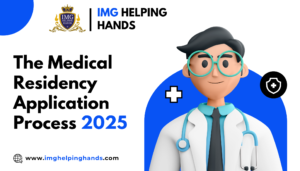
Are you ready to embark on one of the most transformative journeys in your medical career? The residency match process is a pivotal step for
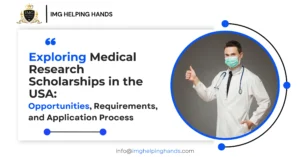
Pursuing medical research in the United States offers unparalleled opportunities for academic growth, access to cutting-edge technology, and the ability to work alongside leading experts
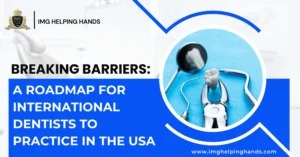
Embarking on a journey to practice dentistry in the United States is a dream for many international dentists. In the vast landscape of American dentistry,
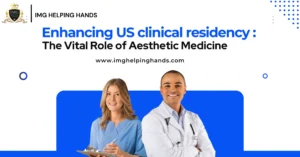
Have you ever considered the transformative power of aesthetics in the field of medicine? Is aesthetic medicine the silent cornerstone of modern clinical practice? Within
We are here to provide a safe and secure helping hand for medical students, graduates, and residents.
Our comprehensive guide will assist you in matching with your top-choice residency or fellowship program.




Payment Methods
Buy with Confidence
© IMG Helping Hands Copyrights 2024 Developed By Ecom Thrust